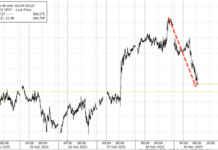ThePrint published a snappily titled piece last week about how “India must exploit its goodwill with Russia. Don’t let multipolarity become ‘messy-polarity’”, which was written by Swasti Rao, an Associate Fellow at her country’s prestigious Manohar Parrikar Institute for Defence Studies and Analyses (IDSA). The gist is that the India Way of accelerating multipolar processes has supposedly become “the end itself” instead of a means towards the end of advancing “clearly defined national interests.”
She then proceeds to describe External Affairs Minister (EAM) Dr. Subrahmanyam Jaishankar’s trip to Moscow right before New Year’s as embodying her constructive critique. According to Rao, “There are at least two major roadblocks to substantiating India-Russia ties in a fast-changing world”: “Economic and geopolitical hurdles” and “The China factor”. Regarding the first, she clarifies that India only continued purchasing Russian oil to advance its own interests, not to spite the West’s sanctions regime.
She also touches upon some well-known payment complications and speculates that Russia is “discomfited” at investing its newly earned rupees into bridging the yawning trade deficit with India due to “increased defense spending back home.” As for the second point, Rao assesses that Russia has become too dependent on the People’s Republic since February 2022, hence her concern that “Russia’s commitment to remain neutral between India and China is anything but a foregone conclusion.”
These observations led to her conclusion that “The India-Russia bilateral relationship is in search of realism – the much-loved continuity endures but inevitable change is looming.” She then wrapped everything up by advising that “New Delhi should certainly engage Russia in more constructive terms, capitalise on the goodwill of historic friendship and set up enabling frameworks to reduce trade deficit et al. But at the same time, it must not lose sight of the end—lest multipolarity become messy-polarity.”
Rao’s article makes some relevant points, but her worries about messy-polarity are misplaced, the same as can be said about her critique of EAM Jaishankar’s India Way. So long as India continues prioritizing its national interests, and there’s no indication that it’ll reconsider this grand strategy even under newfound American pressure, then multipolar processes will continue accelerating. The challenge is that the aforesaid interests can’t be clearly defined like she wants due to the complex global systemic transition.
The unipolar order that arrived after the end of the Old Cold War eventually gave way to an even briefer period of Sino-US bi-multipolarity that began to evolve into Indian-led tri-multipolarity from February 2022 onward. Readers can learn more about this here, but it can be summed up as India prioritizing its national interests in this context like Rao explained in parallel with leveraging its status as the world’s largest developing country to lead the disparate collection of similarly positioned Global South states.
After becoming the Voice of the Global South throughout the course of last year’s G20 chairmanship, India was able to position itself as the leader of the Global South, which is the third pole at this phase of the global systemic transition together with the US-led West’s Golden Billion and the Sino–Russo Entente. The Global South is too diverse to operate at the level of synchronicity that the other two do, and even within the latter there are some divisions, but these countries all share the same primary interests.
They want to accelerate multipolar processes since they believe that the emerging world order will be fairer and more just for countries like them than the brief bi-multipolar one and the unipolar order before that. At the very least, even the smaller-sized states believe that they can have more economic and political options than they previously did, which could give them greater possible benefits. Because everything remains in flux, it’s simply not possible to have clearly defined national interests right now.
The most that any major player like India can hope for are broad ones like maximally diversifying its energy and military partnerships while doing its utmost to serve as a reliable valve from Western pressure for Russia in order to preemptively avert that country’s speculative dependence on China. About that last-mentioned assessment which Rao is so concerned about, it’s explained more in the previously hyperlinked analyses but will now be clarified for the casual reader’s convenience.
Russia fears potentially disproportionate dependence on China because that would revive Sino-US bi-multipolarity with all the attendant structural limitations on its sovereignty, hence why it’s been prioritizing relations with India since policymakers envisage it playing the role described above. This admittedly hasn’t been articulated all that well to Indian experts since their Russian counterparts are either uncomfortable candidly acknowledging concerns about China or don’t know how to phrase them.
Valdai Club Programme Director and Dean of the School of International Relations at MGIMO University Andrey Sushentsov, who’s one of the country’s most respected experts, urged his Russian and Indian peers to discover the next “big idea” in bilateral relations in the piece that he published in late October. It was argued here that the tri-multipolarity concept, with its associated Russian-Indian interplay at the core of these processes, should serve that purpose.
This week’s first-ever Valdai Club Russia-India conference in New Delhi sought to make headway on that proposal seeing as how it brought together both countries’ top experts to discuss “the crisis of modern international relations and views on a possible future world order.” RT reported that “Discussions were held both publicly and in closed-door format” on various dimensions of their ties and importantly quoted Valdai Club research director Fyodor Lukyankov’s assessment of their strategic role:
“Russia and India are two countries that are ‘best prepared to operate in the new world order’ – better than the US or China – as they have shown a high level of resilience against geopolitical challenge, which primarily comes from understanding of the need to be self-sufficient. ‘Russia and India are now in the process of reinventing themselves. We need to reinvent our mutual cooperation for better functioning in turbulent international relations,’ he concluded.”
This development, which came just a few days after Rao’s article, should hopefully put her worries to rest about Russia’s possible partisanship in favor of China should that country and India clash again. As for her concerns about their trade ties and attendant payment complications, EAM Jaishankar focused on precisely these subjects during his trip to Moscow. Foreign Minister Sergey Lavrov even lauded these discussions during their joint press conference and expressed optimism that all issues will be resolved.
Nevertheless, it’s understandable that some experts might feel disconcerted by the lack of clearly defined national interests in this particular relationship and Indian foreign policy in general, but it’s not possible for any country to have them due to the complexities of the systemic transition. The India Way of prioritizing broad interests in this complicated context, whose utility is proven by recent events in Indo-Russo ties, is the best possible option. Hopefully Rao and others will come to appreciate this.























